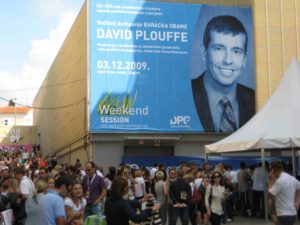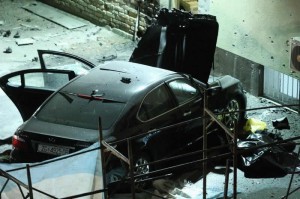A huge banner with a photo of David Plouffe festooned a media conference I attended in Croatia last week. The former Obama campaign manager is coming to Zagreb later this year and those running local election campaigns are eager to welcome “the unsung hero” who “helped restore the trust in the United States of America.”

Media Magnet?
All good, you say. America’s influence in setting the media/political/social agenda in far off countries is once again confirmed.
The truth is a bit more complicated.
Yes, the achievements of Barack Obama and his campaign staff in last year’s election can offer inspiration and ideas to political organizers around the globe. But the problem is that the same skill set can be applied to manipulate public opinion while the real news is concealed or ignored.
Unless you set political trade craft upon a foundation of democracy and free expression, the media and political techniques being discussed — what Russians like to call “political technologies” — are at best irrelevant and, at worst, harmful.
Take this seaside conference for instance, which was billed as a “media festival” for experts in communication from the former Yugoslavia — in local parlance, “the region.” Some 2,000 young specialists in marketing and advertising, lobbyists and new media experts, came together from Croatia, Slovenia, Serbia, Bosnia and Herzegovina, Macedonia, Kosovo and Albania. Although there was plenty of technical discussion about Web strategies, social media, and marketing, there was a kind of political sterility to it, remarkable given the fact that the countries represented here were at war during the participants’ living memory.
Some say the best way to make progress is to agree to keep some topics “off limits” and rebuild personal relationships through politically neutral discussions. Nikola Vrdoljak, a Croat responsible for getting “regional” participants to the festival, said the first time this was tried — one year ago — the head of Serbian television (RTS), Aleksandar Tijanic, had a productive discussion with the head of Croatian television (HRT). “This was a guy who was known as Milosevic’s Goebbels, so we figured that if the two of them could get along, we had a chance of growing a common media market — which is something we all need.”

Oct. 2008: Improvised anti-Editorial Device in Zagreb
Yet the same time these pragmatic discussions are taking place, the independent media in practically all the countries of the ex-Yugoslavia are under attack — literally. A year ago, the publisher of one of Zagreb’s news weeklies was killed by a bomb placed in his car in the center of town. Other Croatian journalists have been beaten, intimidated and fired for daring to speak out about corruption and graft. Last month, a photographer in Montenegro was beaten up by a mayor and his son for taking a photo of the mayor’s illegally parked car. The only evidence of this media dark side at the “festival” was provided by a leading young journalist, Hrvoje Appelt, who has produced a remarkable documentary exhibit and Web site cataloging attacks on journalists. This exhibit occupied a much less obvious position near the registration desk for the festival.
The good news is that many of those in attendance went up to Appelt to congratulate him. The bad news is that they did so quietly. David Plouffe might do well to mention this in his talk in Zagreb.